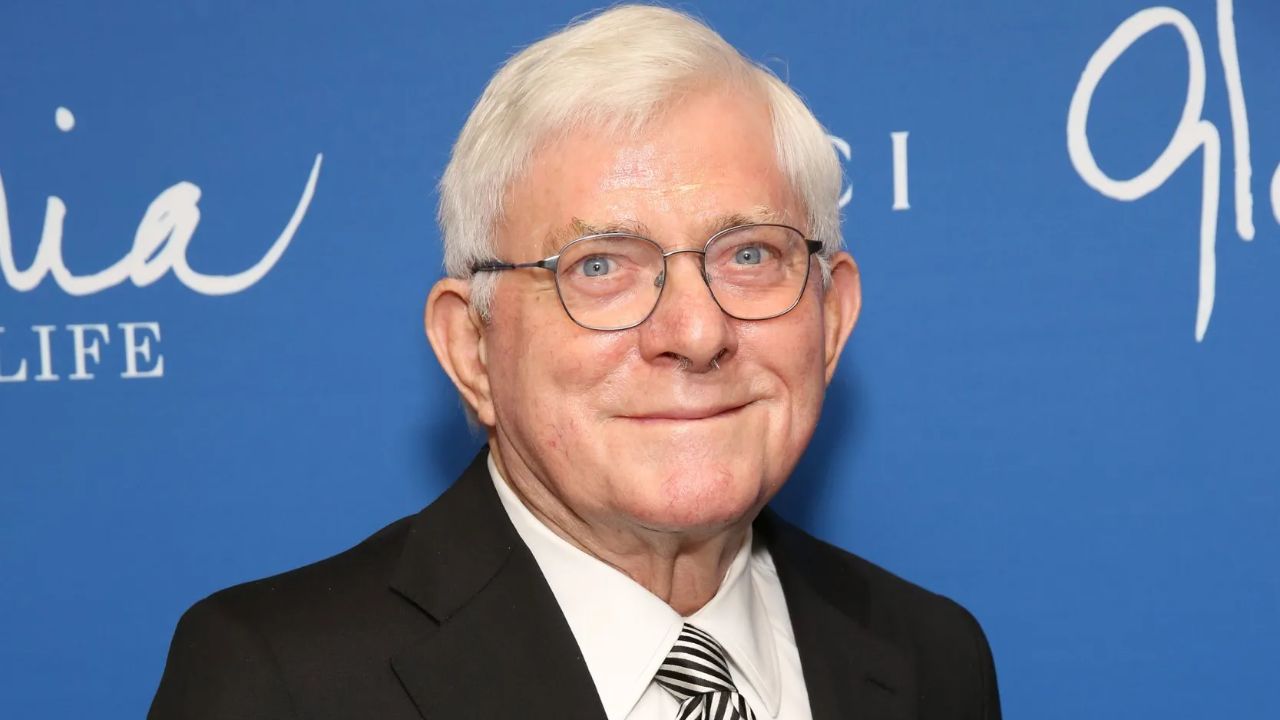Phil Donahue's journey with Alzheimer's is more than just a medical story; it's a powerful reminder of the challenges and triumphs faced by millions around the world. As one of America's most iconic talk show hosts, Donahue's legacy extends far beyond the screen. His openness about his diagnosis has brought attention to a condition that affects countless families, sparking important conversations about caregiving, memory loss, and the importance of early detection. In this article, we delve into the life of Phil Donahue, his battle with Alzheimer's, and the lessons we can all learn from his experience.
When Phil Donahue first revealed his diagnosis, it sent shockwaves through the media world. Known for his pioneering talk show "The Phil Donahue Show," he was a household name for decades. But now, as he faces one of the most challenging health battles of his life, Donahue continues to inspire with his courage and grace. This article will explore his journey, providing insights into the realities of living with Alzheimer's and the importance of raising awareness.
Alzheimer's disease is not just a personal battle; it's a global issue that demands attention. Through Phil Donahue's story, we aim to shed light on the challenges faced by patients and caregivers alike. By understanding the symptoms, treatments, and resources available, we can better support those affected by this devastating condition. Let's dive deeper into Phil's story and the broader context of Alzheimer's disease.
Read also:Bane Dark Knight Rises Actor The Man Behind The Mask
Biography of Phil Donahue
Early Life and Career
Phil Donahue was born on December 8, 1935, in Cleveland, Ohio. Growing up in a modest family, he developed a passion for communication and storytelling from an early age. After graduating from Bowling Green State University with a degree in education, Donahue began his career in broadcasting. His big break came in 1967 when he launched "The Phil Donahue Show" in Dayton, Ohio, which eventually became a national phenomenon.
Throughout his career, Donahue tackled controversial topics with courage and empathy, paving the way for modern talk shows. He wasn't afraid to address issues like politics, social justice, and personal struggles, making him a trailblazer in the world of television. His influence extended beyond entertainment, as he became a voice for the voiceless and a catalyst for change.
Below is a summary of Phil Donahue's personal and professional life:
| Full Name | Philip Joseph Donahue |
|---|---|
| Date of Birth | December 8, 1935 |
| Place of Birth | Cleveland, Ohio |
| Education | Bowling Green State University |
| Profession | Talk Show Host, Author, Activist |
| Notable Work | The Phil Donahue Show |
| Spouse | Marian Marz |
Phil Donahue's Diagnosis with Alzheimer's
The Initial Signs
Like many others, Phil Donahue's journey with Alzheimer's began subtly. At first, he noticed minor memory lapses and moments of confusion, which are common early symptoms of the disease. However, as time went on, these episodes became more frequent and pronounced, prompting him to seek medical advice. In 2019, after a series of tests and evaluations, Donahue received the official diagnosis that would change his life forever.
Alzheimer's disease is a progressive neurological disorder that affects memory, thinking, and behavior. It's the most common form of dementia, accounting for 60-80% of cases. While there is no cure, early detection and intervention can significantly improve quality of life for patients and their families. Donahue's openness about his condition has helped break the stigma surrounding Alzheimer's, encouraging others to seek help without fear or shame.
Understanding Alzheimer's Disease
Causes and Risk Factors
Although the exact cause of Alzheimer's remains unknown, researchers have identified several risk factors that contribute to its development. Age is the most significant factor, with the majority of cases occurring in people over 65. Genetics also plays a role, as those with a family history of the disease are at higher risk. Other factors include lifestyle choices, cardiovascular health, and education level.
Read also:What Happened To King Von A Deep Dive Into The Rise And Tragic Fall
- Age: The risk of Alzheimer's doubles every five years after the age of 65.
- Genetics: Certain gene mutations increase susceptibility to the disease.
- Lifestyle: Poor diet, lack of exercise, and social isolation can exacerbate symptoms.
- Health Conditions: Conditions like diabetes, hypertension, and obesity are linked to increased risk.
Understanding these factors can help individuals make informed decisions about their health and well-being. While some risks are unavoidable, others can be mitigated through lifestyle changes and proactive healthcare.
The Impact of Alzheimer's on Families
Caregiving Challenges
Living with Alzheimer's is not just a personal challenge; it affects entire families. Caregivers often bear the brunt of the disease, managing everything from daily routines to emotional support. The stress and strain of caregiving can be overwhelming, leading to burnout and decreased quality of life for both the caregiver and the patient.
Research shows that caregivers of Alzheimer's patients are more likely to experience depression, anxiety, and physical health problems. That's why it's crucial for families to seek support through counseling, support groups, and respite care. By building a strong network of resources, caregivers can better cope with the demands of their role and provide the best care possible for their loved ones.
Treatment Options for Alzheimer's
Current Approaches
While there is no cure for Alzheimer's, several treatments are available to manage symptoms and slow disease progression. Medications like cholinesterase inhibitors and memantine are commonly prescribed to improve cognitive function and memory. Additionally, non-pharmacological interventions such as cognitive therapy, exercise, and a healthy diet can play a vital role in maintaining overall well-being.
Recent advancements in research have shown promise in developing new treatments, including immunotherapy and gene therapy. These innovative approaches aim to target the underlying causes of Alzheimer's rather than just its symptoms. Although more studies are needed, these breakthroughs offer hope for the future of Alzheimer's care.
Phil Donahue's Legacy
Inspiring Others
Despite the challenges he faces, Phil Donahue continues to inspire with his unwavering spirit and determination. His willingness to share his story has brought much-needed attention to Alzheimer's disease, encouraging others to seek help and support. Through his advocacy work, Donahue has become a symbol of resilience and hope for millions of people affected by this condition.
Donahue's legacy extends beyond his talk show career. He has authored several books, including "The War Room: How the Press Covers Conflict" and "America: What Went Wrong?" which explore important social and political issues. His contributions to journalism and activism have left an indelible mark on American society, reminding us of the power of communication and empathy.
Raising Awareness
The Importance of Education
Education is key to combating the stigma and misinformation surrounding Alzheimer's disease. By increasing awareness, we can foster a more supportive and understanding society for those affected by the condition. Organizations like the Alzheimer's Association and the National Institute on Aging provide valuable resources for patients, caregivers, and healthcare professionals alike.
Community involvement is also crucial in the fight against Alzheimer's. Participating in events like Walk to End Alzheimer's and supporting research initiatives can make a significant impact. Every effort, no matter how small, contributes to the greater goal of finding a cure and improving the lives of those affected by this devastating disease.
Living Well with Alzheimer's
Tips for Patients and Caregivers
While Alzheimer's presents many challenges, there are ways to live well with the condition. By focusing on what can be controlled, patients and caregivers can maintain a sense of normalcy and purpose. Here are some tips for managing life with Alzheimer's:
- Stay socially engaged by participating in activities and events.
- Practice mindfulness and stress-reduction techniques like meditation and yoga.
- Follow a balanced diet rich in fruits, vegetables, and omega-3 fatty acids.
- Exercise regularly to improve physical and mental health.
- Seek professional support when needed, whether through therapy or support groups.
By adopting these strategies, individuals can enhance their quality of life and better cope with the challenges of Alzheimer's.
The Future of Alzheimer's Research
Innovative Solutions
As research continues to advance, new possibilities for treating and preventing Alzheimer's are emerging. Scientists are exploring groundbreaking technologies like brain imaging, biomarkers, and artificial intelligence to better understand the disease and develop targeted therapies. These innovations hold the potential to revolutionize Alzheimer's care and improve outcomes for patients worldwide.
Collaboration between researchers, healthcare providers, and advocacy groups is essential in driving progress. By pooling resources and expertise, we can accelerate the discovery of effective treatments and ultimately find a cure for Alzheimer's disease.
Conclusion
Phil Donahue's battle with Alzheimer's is a testament to the strength and resilience of the human spirit. Through his openness and advocacy, he has brought much-needed attention to a condition that affects millions of people worldwide. By understanding the causes, symptoms, and treatments of Alzheimer's, we can better support those affected by the disease and work towards a brighter future.
We invite you to join the conversation and share your thoughts and experiences in the comments below. Together, we can create a more compassionate and informed society for everyone impacted by Alzheimer's disease. Don't forget to explore our other articles for more insights and resources on this important topic.
Table of Contents
- Biography of Phil Donahue
- Phil Donahue's Diagnosis with Alzheimer's
- Understanding Alzheimer's Disease
- The Impact of Alzheimer's on Families
- Treatment Options for Alzheimer's
- Phil Donahue's Legacy
- Raising Awareness
- Living Well with Alzheimer's
- The Future of Alzheimer's Research
- Conclusion



